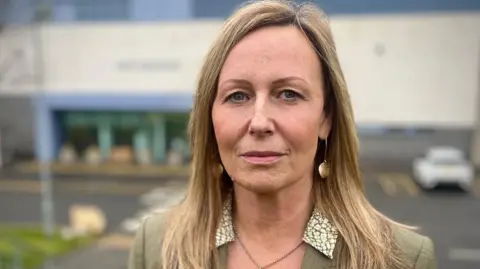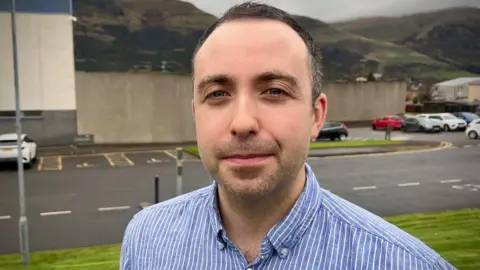David CowanScotland home affairs correspondent
 BBC
BBCA fortnight into her new job as governor of an overcrowded, understaffed jail, Sharanne Findlay faced what she described as the worst week of her career.
Angry prisoners at HMP Glenochil in Clackmannanshire orchestrated three consecutive sit-down protests within the space of a few days, ramping up the tension inside the facility.
Back-up was drafted in from other jails to help bring the demonstrations to a peaceful conclusion, but the indiscipline highlighted major problems at Glenochil which are the subject of a new inspection report.
Its contents have been described as “yet another reminder” of the systematic challenges facing Scotland’s justice sector, as MSPs prepare to vote on plans to release up to 1,000 prisoners early to ease pressure on the system.
When the chief inspector of Scotland’s prisons visited Glenochil in February this year, the jail was holding 770 inmates, far beyond its design capacity of 668.
The strain of working in a jail with too many prisoners had caused high levels of staff absences, which in turn made things even harder for the remaining staff and prisoners alike.
The inspectors say the prison regime was curtailed, inconsistent and unpredictable, with prisoners regularly locked up until late in the morning and from 16:00, with no evening activities.
Ms Findlay said: “When people are living on top of each other day in, day out, it has an impact on the regime and it also has an impact on people’s wellbeing.
“Overall, it just has such a negative impact on the whole jail and the people that we’re looking after in custody.”
Drug abuse was and remains another challenge.
Last December 19 prisoners required emergency hospital treatment after taking illicit substances.

Chief inspector of prisons Sara Snell said her team found many areas of positive practice within Glenochil.
But they raised serious concerns about overcrowding, solitary confinement, food hygiene, the complaints process, the daily regime and the treatment of vulnerable prisoners.
She added conditions continued to breach “minimum standards of human dignity” with 244 men sharing cells built for one.
In the seven months since the inspection, the population has been reduced to 714 and staff absences have fallen by a third.
Another ongoing issue is the complexity of Glenochil’s population, a mixture of short-term and long-term prisoners and 145 serving lifelong sentences.
Around 400 are sex offenders and a quarter are aged over 50, with some in their 80s.
The jail’s healthcare unit was described as “excellent” by Ms Snell.
But primary care team lead Claire Gallagher said: “The increase in the ageing population, the overcrowding, puts immense pressure on our team.
“More prisoners coming in is going to increase the need for our service and we do really see that here at Glenochil.”
Significant structural changes have had to be made to a wing of the prison which holds elderly sex offenders, creating space for hoists and hospital beds within cells.

A GP at Glenochil for four years, Dr Jack Kildare said: “Palliative care within a prison is something that’s been fairly new, even for me.
“I was quite shocked to hear that some prisoners actually want to die within the prison, because a lot of them are estranged from families and this has become their home.
“We’ve had a couple of people recently whose wish has been fulfilled.
“Although it’s been challenging, we have tried to mirror what happens in the community as best we can.”
Many of the challenges facing Glenochil are mirrored nationwide.
On 7 October, Scotland’s prison population hit an all-time high of 8,430, beating the previous record set in 2012.
The Scottish government is seeking permission from the Scottish Parliament for the emergency early release of up to 990 short-term prisoners between now and April.
Inmates convicted of sex offences and domestic abuse will be excluded and governors will have a veto if they think releasing a prisoner will pose an immediate risk of harm to an identifiable individual or group of people.
At Glenochil, only 50 inmates would be eligible, but it would still benefit if it didn’t have to take in prisoners from jails like Barlinnie, Edinburgh and Polmont.
Ms Findlay said overcrowding is hampering efforts to rehabilitate prisoners, and that in turn affects wider society.
She added: “Unless we actually have some respite to the numbers of people in prison, the prison service is at breaking point.
“People are not getting the opportunities that they actually need.
“If this vote doesn’t go through on Wednesday, we’re really going to be struggling for the future.”
The chief inspector Sarah Snell said: “There’s no other easy short-term measure to reduce the population.
“It doesn’t bring down the prison population overall in the long term.”
The Scottish Conservatives and Scottish Labour have described emergency early release as a “sticking plaster solution.”
An independent commission is searching for long-term answers.
Disclaimer : This story is auto aggregated by a computer programme and has not been created or edited by DOWNTHENEWS. Publisher: BBC








